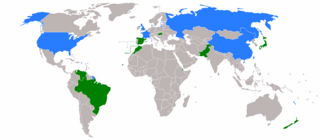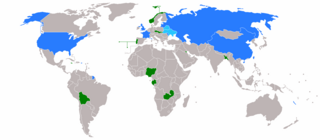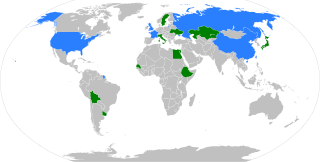
The G4 nations, comprising Brazil, Germany, India, and Japan, are four countries which support each other's bids for permanent seats on the United Nations Security Council. Unlike the G7, where the common denominator is the economy and long-term political motives, the G4's primary aim is the permanent member seats on the Security Council. Each of these four countries have figured among the elected non-permanent members of the council since the UN's establishment. Their economic and political influence has grown significantly in the last decades, reaching a scope comparable to the permanent members (P5). However, the G4's bids are often opposed by the Uniting for Consensus movement, and particularly their economic competitors or political rivals.

Reform of the United Nations Security Council (UNSC) encompasses five key issues: categories of membership, the question of the veto held by the five permanent members, regional representation, the size of an enlarged Council and its working methods, and the Security Council-General Assembly relationship. The Member States, regional groups and other Member State interest groupings developed different positions and proposals on how to move forward on this contested issue.

The 2008 United Nations Security Council election was held on 17 October 2008 during the 63rd session of the United Nations General Assembly, held at United Nations Headquarters in New York City. The elections were held for five non-permanent seats on the UN Security Council for two-year mandates commencing on 1 January 2009.

The 2014 United Nations Security Council election was held on 16 October 2014 during the 69th session of the United Nations General Assembly, held at United Nations Headquarters in New York City. The elections were for five non-permanent seats on the UN Security Council for two-year mandates commencing on 1 January 2015. In accordance with the Security Council's rotation rules, whereby the ten non-permanent UNSC seats rotate among the various regional blocs into which UN member states traditionally divide themselves for voting and representation purposes, the five available seats were allocated as follows:

The 2011 United Nations Security Council election was held on 21 and 24 October 2011 during the Sixty-sixth session of the United Nations General Assembly, held at United Nations Headquarters in New York City. The General Assembly elected Azerbaijan, Guatemala, Morocco, Pakistan, and Togo, as the five new non-permanent members of the UN Security Council for two-year mandates commencing on 1 January 2012. Azerbaijan was elected after 17 rounds on 24 October, while the other four new members were chosen on 21 October.

The 2015 United Nations Security Council election was held on 15 October 2015 during the 70th session of the United Nations General Assembly, held at United Nations Headquarters in New York City. The elections are for five non-permanent seats on the UN Security Council for two-year mandates commencing on 1 January 2016. In accordance with the Security Council's rotation rules, whereby the ten non-permanent UNSC seats rotate among the various regional blocs into which UN member states traditionally divide themselves for voting and representation purposes, the five available seats are allocated as follows:

The 1993 United Nations Security Council election was held on 29 October 1993 during the Forty-eighth session of the United Nations General Assembly, held at United Nations Headquarters in New York City. The General Assembly elected Argentina, the Czech Republic, Nigeria, Oman, and Rwanda, as the five new non-permanent members of the UN Security Council for two-year mandates commencing on 1 January 1994. Oman and Rwanda were elected for the first time ever, while the Czech Republic was elected for the first time as a separate country after the dissolution of Czechoslovakia.

The 1992 United Nations Security Council election was held on 27 October 1992 during the Forty-seventh session of the United Nations General Assembly, held at United Nations Headquarters in New York City. The General Assembly elected Brazil, Djibouti, New Zealand, Pakistan, and Spain, as the five new non-permanent members of the UN Security Council for two-year mandates commencing on 1 January 1993.

The 1984 United Nations Security Council election was held from 22 October to 18 December 1984 during the Thirty-ninth session of the United Nations General Assembly, held at United Nations Headquarters in New York City. The General Assembly elected Australia, Denmark, Madagascar, Thailand, and Trinidad and Tobago, as the five new non-permanent members of the UN Security Council for two-year mandates commencing on 1 January 1985. Madagascar, Thailand and Trinidad and Tobago were elected to Council for the first time.

The 1982 United Nations Security Council election was held on 19 October 1982 during the Thirty-seventh session of the United Nations General Assembly, held at United Nations Headquarters in New York City. The General Assembly elected Malta, the Netherlands, Nicaragua, Pakistan, and Zimbabwe, as the five new non-permanent members of the UN Security Council for two-year mandates commencing on 1 January 1983. Both Malta and Zimbabwe were elected members of the Council for the first time.

The 1978 United Nations Security Council election was held on 10 November 1978 during the Thirty-third session of the United Nations General Assembly, held at United Nations Headquarters in New York City. The General Assembly elected Bangladesh, Jamaica, Norway, Portugal, and Zambia, as the five new non-permanent members of the UN Security Council for two-year mandates commencing on 1 January 1979. Notably, Bangladesh, Jamaica and Portugal were elected members of the council for the first time.

The 2016 United Nations Security Council election was held on 28 June during the 70th session of the United Nations General Assembly, held at United Nations Headquarters in New York City. The elections were for five non-permanent seats on the UN Security Council for two-year mandates commencing on 1 January 2017. In accordance with the Security Council's rotation rules, whereby the ten non-permanent UNSC seats rotate among the various regional blocs into which UN member states traditionally divide themselves for voting and representation purposes, the five available seats were allocated as follows:

The 2019 United Nations Security Council election was held on 7 June during the 73rd session of the United Nations General Assembly, held at United Nations Headquarters in New York City. The elections are for five non-permanent seats on the UN Security Council for two-year mandates commencing on 1 January 2020.

The 2020 United Nations Security Council election was held on 17 and 18 June 2020 during the 74th session of the United Nations General Assembly, held at United Nations Headquarters in New York City. The elections were for five non-permanent seats on the UN Security Council for two-year mandates commencing on 1 January 2021.

The 2021 United Nations Security Council election was held on 11 June 2021 during the 75th session of the United Nations General Assembly, held at United Nations Headquarters in New York City. The elections are for five non-permanent seats on the UN Security Council for two-year mandates commencing on 1 January 2022. In accordance with the Security Council's rotation rules, whereby the ten non-permanent UNSC seats rotate among the various regional blocs into which UN member states traditionally divide themselves for voting and representation purposes, the five available seats are allocated as follows:

The 1973 United Nations Security Council election was held on 15 October 1973 during the Twenty-eighth session of the United Nations General Assembly, held at United Nations Headquarters in New York City. The General Assembly elected the Byelorussian SSR, Cameroon, Costa Rica, Iraq, and Mauritania, as the five new non-permanent members of the UN Security Council for two-year mandates commencing on 1 January 1974. This was the first election of Cameroon, Costa Rica and Mauritania and the only election of Byelorussian SSR into the council.
The 2023 United Nations Security Council election was held on 6 June 2023 during the 77th session of the United Nations General Assembly, held at United Nations Headquarters in New York City. The elections are for five non-permanent seats on the UN Security Council for two-year mandates commencing on 1 January 2024. In accordance with the Security Council's rotation rules, whereby the ten non-permanent UNSC seats rotate among the various regional blocs into which UN member states traditionally divide themselves for voting and representation purposes, the five available seats are allocated as follows:
The 2024 United Nations Security Council election will be held in mid-2024 during the 78th session of the United Nations General Assembly, held at United Nations Headquarters in New York City. The elections are for five non-permanent seats on the UN Security Council for two-year mandates commencing on 1 January 2025. In accordance with the Security Council's rotation rules, whereby the ten non-permanent UNSC seats rotate among the various regional blocs into which UN member states traditionally divide themselves for voting and representation purposes, the five available seats are allocated as follows:
The 2026 United Nations Security Council election will be held in mid-2026 during the 80th session of the United Nations General Assembly, held at United Nations Headquarters in New York City. The elections are for five non-permanent seats on the UN Security Council for two-year mandates commencing on 1 January 2027. In accordance with the Security Council's rotation rules, whereby the ten non-permanent UNSC seats rotate among the various regional blocs into which UN member states traditionally divide themselves for voting and representation purposes, the five available seats are allocated as follows:
















